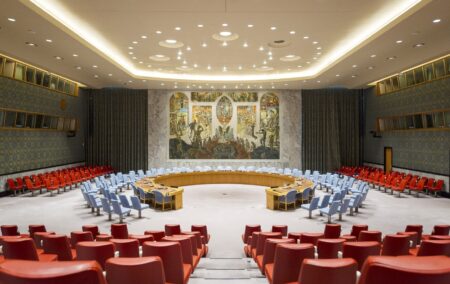The most basic explanation for the term law is the rules and regulations that govern interactions between people to promote peace and harmony among all the inhabitants of Earth.
The contradiction then comes with the consensual nature of international law-enacting of proposed laws. A treaty is an officially binding document stating how a state should act in certain situations, and the document is recognized by the law . The real question is whether a treaty is “actually law binding to all member states or only to “periphery states” according to the tenets of the World Systems Theory.
Russia as the permanent member of the UN Security Council
Russia, China, the United Kingdom, and the United States are permanent UN Security Council members. This indicates an imbalance of power which justifies the World System Theory. This power imbalance has continuously been undermined and pampered on the principles of international law, and so too have global peace resolutive mechanisms and security.
As a permanent member of the UN Security Council, Russia must uphold peace as obligated by the UN Charter. One way the UN Security Council implemented this was the Nuclear Nonproliferation Treaty, which aimed to shrink nuclear weapons in the interest of global peace and security. However, Russia’s volume of nuclear weapons contradicts this treaty. Since Russia has the highest number of nuclear weapons, this leverages the country’s dominance on the battlefield. Russia did not fulfill the agreements of the treaty, and as such, should be held accountable. This leads to scrutinization of the obligatory character of international law. Since Russia possesses the veto power, the UN Security Council cannot hold it accountable. This explains the ineffectiveness of the Security Council’s peaceful resolution on Russia-Ukraine during the war.
Recognizing Treaties as Legal Bidding
The law exists to make sure that harmony exists. Any act that poses a threat to humanity should be punishable by law. Treaties guide the interaction and the behaviour of states among each other; hence they are recognized under international law.
Russia did not follow protocol, and as such, it should be punished. The reasons for the invasion of Ukraine were neither self-defence nor an authorized attack. Russia’s reason for the invasion was solely based on identity matters. War and security threats are referred to the Security Council, in which the Council decided to sanction Russia. Though the Council has the right to act, according to Chapter 7, Russia does feel the heat of the sanction, which is why the war is still ongoing even today.
The tendency to defy treaties, especially from core states, is much more usual. A recent case is the use of the United States veto power, to support Israel in the Palestinian war. The US vetoed a resolution calling for a humanitarian pause made by the UN Security Council in support of Israel. The actions of the US are in contradiction with the Geneva Convention, which aims at protecting soldiers and civilians during the time of war. To date, Israel has killed 40000 Palestinians of which 16456 are children. Israel having the backing of US makes the resolutions taken by the Council ineffective, especially since having the power of veto means that the state is not obligated to execute the resolution.
In conclusion, the obligatory character of international law may render it ineffective in certain cases with power imbalances. The veto power of the five permanent UN Security Council members should be revoked, centralizing the power. The judgment of the UN Security Council will be final; no state can defy the judgment without bearing the harsh consequences.
This is the third of three essays on the theme of South Africa and international law submitted to the Daily Friend on behalf of students in the Department of Politics and International Relations at the University of Johannesburg by assistant lecturer Ndzalama Mathebula.
[Photo: UN Security Council Chamber/UN]
The views of the writer are not necessarily the views of the Daily Friend or the IRR
If you like what you have just read, support the Daily Friend


